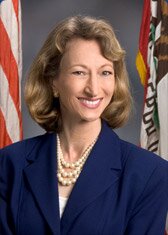


Ever since she was first elected to the State Legislature in 1992, Debra Bowen has been a pioneer in government reform, consumer protection and privacy rights, environmental conservation, and open government.
Learn more about why Debra Bowen should be California's next Secretary of State. |
FOR IMMEDIATE RELEASE
Bowen Effort to Restore Confidence in the Secretary of State's Office Clears First Committee Hurdle
SACRAMENTO - Instilling confidence in voters that the Secretary of State is focused solely on the integrity of the electoral process is the goal of SB 11 by Senator Debra Bowen (D-Redondo Beach), which was approved today by the Senate Elections, Reapportionment & Constitutional Amendments Committee on a 4-2 vote. "It boils down to an issue of confidence," said Bowen, who also chairs the committee. "Voters deserve to have confidence in the state's electoral system and they need to know the state's chief elections officer, the one person responsible for certifying election results for state and federal offices in California, is doing business in a nonpartisan fashion." SB 11 prevents the Secretary of State or any candidate for the office from supporting or opposing any candidate for public office or any ballot measure and from serving as an officer of any political party or partisan organization. The bill represents a more comprehensive approach to making the Secretary of State's office truly nonpartisan, in contrast to other measures which simply propose to remove the party designation that's next to the Secretary of State's name. "Just eliminating the R, D, L, G, PF or other party label next to the Secretary of State's name won't prevent him or her from getting involved in campaigns in a way that leads voters to question the Secretary's impartiality," continued Bowen. "Simply saying the office is nonpartisan doesn't do anything to reduce or eliminate the inherent conflict of interest between the Secretary's responsibility to ensure elections are conducted in a fair and nonpartisan manner, and partisan activities, such as supporting a candidate whose very election the Secretary of State will certify. "The Secretary of State shouldn't be co-chairing a presidential campaign and thanking donors for contributing to a particular candidate, which happened in Ohio in 2004, or chairing a presidential campaign while simultaneously ordering state elections boards to stop hand counting ballots, which happened in Florida in 2000." SB 11 also prevents voting equipment manufacturers and vendors from making campaign contributions to candidates for state or local office and precludes candidates from accepting such contributions. Under the bill, accepting a donation would be a violation of the Political Reform Act, which could lead to a fine of up to $5,000, a possible civil suit, and the potential for a criminal misdemeanor prosecution. "When you look at the kinds of things that went on in November, everything from phantom votes appearing in Ohio to votes being 'lost' by a North Carolina voting machine to a Florida machine that started subtracting votes, it's natural to wonder whether election results are being manipulated or whether these machines are so bug-ridden no one should be using them," continued Bowen. "When a county decides to buy a particular type of voting machine, there shouldn't be any question about whether the decision to buy a particular system was influenced by campaign contributions." California law limits the amount of money people can contribute to political campaigns, but only lobbyists are banned from making contributions to candidates for offices they're registered to lobby before. However, according to the National Conference of State Legislatures, 22 states prohibit corporations from contributing to candidates and 14 states prohibit labor unions from contributing to candidates. "Voting technology isn't just about counting pieces of paper with the names of candidates on them any longer, it's a giant, multi-billion dollar industry that creates winners and losers when a state or a county decides to go with one company instead of another," continued Bowen. "Contracting for voting equipment isn't like contracting for paper clips or copy machine repair work because the stakes are exponentially higher. If the copy machine isn't working right, you know it immediately, but if a voting machine malfunctions or has been tampered with, people may never know whether their votes were recorded accurately or if they were recorded at all." According to an August 2004 report from electionline.org, the main electronic voting equipment manufacturers (Diebold, ES&S, Hart InterCivic, and Sequoia) contributed over $650,000 between 2001 and 2003 to candidates running for office across the country, including four candidates for Secretary of State. In California, Sequoia donated $8,000 to candidates for state office in 2001-02, while ES&S made $10,000 in contributions to candidates for state office in 2001-02. SB 11 will be heard next in the Senate Appropriations Committee sometime in April. ### |
|
| Paid for by Debra Bowen for Secretary of State, 2005 N Street, Sacramento, CA 95814 © 2005 Debra Bowen for Secretary of State, ID #1271345 |